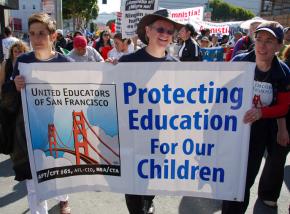Reformers in SF teachers’ union make gains
, a candidate for president of United Educators of San Francisco in this month's election, looks at the impact of a new reform caucus in her union.
THE INCUMBENT union officers in United Educators of San Francisco (UESF) have won reelection, but the candidates and supporters of Educators for a Democratic Union (EDU) are celebrating their strong showing after little more than four months of organizing.
EDU candidates for the union's top offices won 41 percent of the vote, and the caucus took 11 seats on the union's executive board--about one-third of the total--as well as three of 13 delegate spots on the San Francisco Labor Council.
EDU members are energized by the outcome, and are already planning what's next. In response to the election results one caucus member wrote, "It is clear that our best days are ahead of us, and this election has really clarified what we need to do."
EDU's accomplishments in the course of the election are many. EDU has pushed to put the issues that affect our most-often sidelined members--paraprofessionals and substitutes--in the center of UESF discussions. This pressure forced the UESF leadership, run by the Progressive Leadership Caucus (PLC), to take a more aggressive and public stand against layoffs of paras.

In response to EDU's active campaign, UESF has been more communicative with its members over the last months, and attempted to take a more activist approach to fighting the increase in class sizes. These are welcome changes, and EDU can help push for more.
We have much to do to prepare for the cuts that Sacramento and the school district will attempt as the economic crisis continues. The PLC leadership clearly would have preferred to stay publicly neutral on Gov. Arnold Schwarzenegger's recent disastrous spending cap proposal, Proposition 1A, which was defeated by voters May 19.
However, EDU forced a "no" position into the discussion on the executive board. UESF then rightly voted to oppose this deadly proposition, despite the fact that our affiliate, the California Teachers Association, supported 1A, and spent huge sums doing so.
Unfortunately, when EDU members showed up at a UESF phone bank to help get the word out about the propositions, we were told we weren't allowed to talk about anything except Proposition 1B, which would only guarantee overdue education funding if Prop 1A was also passed. Prop 1B was a bribe, pure and simple--an effort to get voters to accept a state spending cap in the future in return for schools being first in line for the money.
The CTA, unfortunately, embraced that deal. And since the CTA was paying for phone banking, UESF officers told us that we weren't permitted to use union phone lists to talk to our own members about our union's "No on 1A" position. This is indicative of the PLC strategy that puts more emphasis on building relationships with CTA higher-ups than organizing rank-and-file UESF members. This is a method EDU seeks to change.
THE MOST significant accomplishment of EDU is that we have built a vibrant reform caucus in our union in such a short time. EDU will continue to build union strength at the school sites and pressure UESF leadership to operate in a more open and democratic way. EDU organizes to bring in new voices, rather than leave leading to a chosen few.
Many UESF activists who are often frustrated by both the lack of information and transparency from our current leadership will find a welcome home in EDU in the coming years. The "rainy day fund" that the city of San Francisco set aside for education is empty. UESF must prepare our members now for a fight--and EDU will be there to make sure our union does that.
Already, Schwarzenegger is moving to make deeper education cuts. Even before the defeat of Prop 1A, he threatened to hack seven-and-and-a-half days out of the school year and cut an additional $2.3 billion from K-12 schools.
Meanwhile, President Obama favors merit pay for teachers, and, in Arne Duncan, has chosen a Secretary of Education best known for leading the charge to privatize the Chicago public school system.
While there's every reason to be excited about the results in the UESF election, EDU has its work cut out for it. Turnout in the election was extremely disappointing, at just under 16 percent. Only 956 out of almost 6,000 UESF members voted. Just 168 paraprofessionals out of 1,500 cast ballots.
Now the attacks are coming fast and furious while the leadership of UESF has neither mobilized nor educated the majority of union members--the very people who have the power to protect public education.
That's exactly why EDU is here to stay. The EDU vision--mobilizing members at their school sites, creating open debate in the union about issues that matter, uniting with other unions and social justice activists--is the only chance we have against attacks like these.


